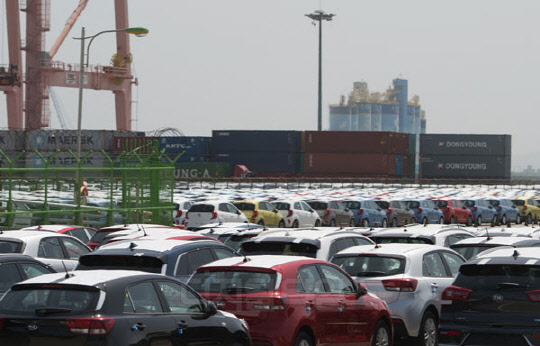Car industry in slow growth… "While 25% tariff to be growth killer”
Ye Jin Soo | jinye@ | 2018-05-25 11:24:03

US President Donald Trump is expected to impose a tariff of up to 25 % on imported cars by applying the Article 232 of the Trade Expansion Act. On May 24, export vehicles are waiting for shipment from Pyeongtaek Port in Gyeonggi Province. By Park Dong-wook fufus@dt.co.kr
Unemployed car tariff promotion industry in `emergency`
As the Trump US administration is pushing for high tariffs of up to 25 % on imported cars, the domestic auto industry is getting tense.
According to the Korea-US Free Trade Agreement, Korea is subject to tariffs on passenger cars exported to the United States, but the United States can impose tariffs if it applies the Trade Expansion Act. Domestic automakers are struggling in the US market due to the won depreciation and the US car market shrinking.
Once the US imposes a 25% tariff on Korean automobiles, profitability will deteriorate because it will not be able to reflect tariff hikes on car sales prices in the highly competitive US market. Also, if the domestic car industry, which is suffering from the negative exchange rate, reflects the price to the tariff, it will fall into a vicious cycle of declining price competitiveness.
Meanwhile, the United States is the largest market for a single market in the domestic automotive industry. Korea exported USD 14.651 billion in automobiles and USD 5.666 billion in auto parts to the United States last year. According to the Korea Automobile Manufacturers Association, Korea exported 253,194 cars to the world last year.
Hyundai & Kia Motors have been struggling in the US recently. The company sold only 1.25 million units, down 10.4% year-on-year, mainly due to stronger marketing by Japanese automakers using Enzyme and reduction in the passenger car market. Last year, Hyundai Motor exported a total of 594,419 units, including 447,000 units, or 307,018 units, of its vehicles sold in the US, and 287,401 units, or 32 percent of Kia Motors, at its Ulsan factory.
According to an expert from the automobile industry, "The labor cost ratio to Hyundai`s 2016 sales rises to 15.2%, and if a 25% tariff bomb is met, the export competitiveness will be completely lost," said Hyundai Kia Motors and pressure will increase. "
High-tariffs are inevitable for Hyundai and Kia Motors, which are seeking to recover sales in the US market in 2H, thanks to the introduction of new models of SUVs such as Kona.
On the other hand, GM Korea, which has carried out measles since the closure of the Gunsan plant, also exported a total of 131,112 units to the United States last year, including mini-car sparks and small sports utility vehicles (SUV) trains. Although US GM is the largest shareholder, export hitting is inevitable if high tariffs are imposed. Renault Samsung Motors` Busan plant also produces Nissan Logs and exports all of its products to the US. Last year, the export volume was 120,320 units.
"The intention of the United States is to spread the trade friction between the US and China to the other side and we need to watch the trend more and more because it changes policy," said Lee Han- It is very worrisome if you are prepared for the loss of competitiveness and the increase of imported car sales. "
Lee Sang-ho, head of industry innovation team at the Korea Economic Research Institute, said, "Looking at the case of steel, it took about a year until the executive order was issued after the commencement of the investigation of the trade extension law. We need to prepare thoroughly. "
By Ye Jin Soo jinye@
